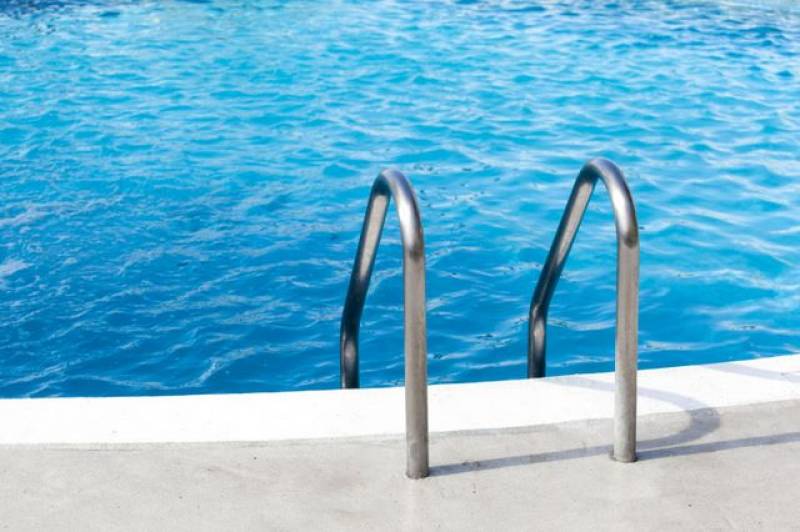Spanish News Today Editors Roundup Weekly Bulletin Apr 12
FEATURED ARTICLES: "Spain prepares to wave goodbye to Golden Visas" and "Airports introduce biometric scanners to prepare for EES and ETIAS"
There was one story that ruled the waves more than any other this week, and that was the news that Spain wants to do away with Golden visas.
What is the Golden visa? What effect will removing it have (if any)? What are the other ways to be able to get a visa or residency to live in Spain? We delve into all these questions, plus the high-tech changes afoot at airports in Spain and your usual mix of local and national stories from this week.
Spanish airports are introducing biometric scanners to prepare for EES and ETIAS
We’re still over a year away from the European Travel Information and Authorisation System (ETIAS) visa waiver system being brought in, which will mean that citizens of non-Schengen countries will have to pay about 7 euros to enter the Eurozone from May 2025, but you can already see that preparations are well underway.
One of the prerequisites for being able to introduce the ETIAS – and one of the reasons why the deadline for its introduction has already been pushed back – is the prior existence of the Entry/Exit System (EES), that is, a way of tracking who is coming and going from the Schengen Area while allowing them not to have to stamp passports anymore.
This is mostly smaller airports such as Murcia’s Corvera airport, where work is currently underway to install these machines, known as ABC eGates (Automated Border Control), by the end of this month. It will mean a major overhaul of the border control at the airport, and will go hand-in-hand with a change in the passenger flow system, new CCTV being installed and modifications to toilets and airport shops. In this way, the terminal will be able to comply with the obligation to have a system for recording entry and exit data for all third-country nationals crossing the external borders of the member states of the European Union.
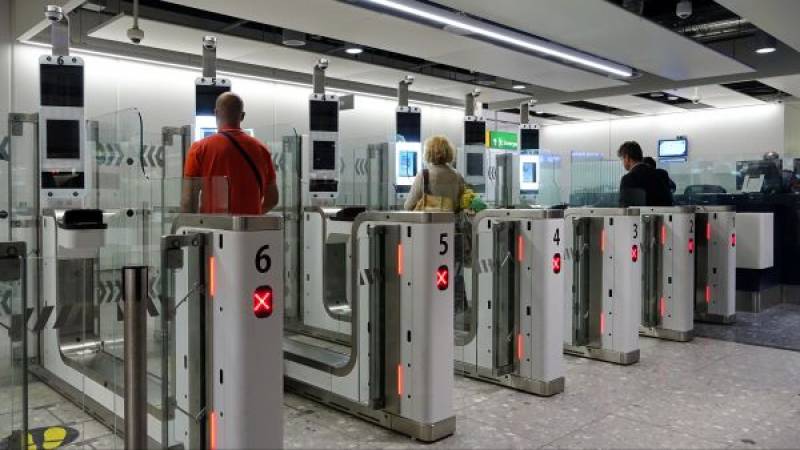
It may all sound a bit futuristic and dystopian, but the truth is that you’ve likely used these sort of passport gates before. Loads of major airports already have them, including London Heathrow Airport (pictured). They scan your passport (all new passports have chips in them which allow them to be read by the machines) and do a quick scan of your face (look into the camera, no smiling), and then the light turns green and you’re dinged through.
Why all the fuss? Weren’t they already tracking who was coming in and out of these countries? That’s what we’ve been waiting in line at passport control for all these years, to be waved through by humourless border police. Yes, but the new system is supposed to automate it, electronicise it, digitise it and make it more efficient, because anything run by a machine is instantly better than if people do it. Give it a couple of years and it’ll probably all be done by AI.
Golden handshake
Since 2013, when it was brought in under the PP government when Mariano Rajoy was President, non-EU citizens have been able to get residency in Spain by purchasing a house worth at least half a million euros; buying at least 1 million euros’ worth of stocks and shares in Spanish companies; investing at least 2 million euros in Spanish public debt securities; or by investing in a business project in Spain which is considered to be of general interest.
In the last 11 years, around 600-odd of these visas have been granted per year, give or take. Around two-thirds of all the people who paid to get EU residency were Chinese and Russian. When the war in Ukraine broke out, Spain decided to limit its Golden visa program for Russians, meaning that in 2022 around half the usual number of Golden visas were issued.
After the Russians, third place went to the Brits, who began seeing the benefits of this type of visa after Brexit, and the fourth most common nationality was from the United States. Between the Brits and the Americans, just a few hundred people each year gained Spanish residency in this way.
The visa is valid initially for 2 years and renewable for 5, and it even entitles the holder the right to work whilst in Spain.
Now, though, in a shock move, President Sánchez has said he wants to stop issuing these Golden visas because it is pushing up housing prices, encouraging property speculation and skewing the Spanish housing market against those who desperately need to be housed – lower-income Spanish families.
“Housing is a constitutional right and not a mere speculative business,” he said. “Having decent housing cannot depend only on the rules of the market.”
In this way, he has promised that his “will be the legislature that turns housing into the fifth pillar of the welfare state”.
Similar Golden visa schemes have already been ended in Portugal and Ireland after they were found to be contributing to steeply rising house prices, having been introduced during the financial crash of 15-odd years ago to combat falling investment in those countries.
Golden visas have also been accused in the past of being linked to money laundering and allowing unsavoury characters to reside in the European Union with few checks and balances, and the European Commission has consistently backed calls to outlaw the practice.
The only thing is, getting rid of the Golden visa will
probably not have the desired effect that the President wants it to have. Doing away with the 500-600 Golden Visas granted each year for the purchase of luxury homes will neither bring property prices down nor free up a significant amount of housing supply, according to analysis by experts in the property sector.
Anyone who wants to buy a home in Spain probably still will, and if they want to become a resident there are
many other ways to do it. Those who were planning to buy property in Spain only because they could get automatic residency if they spent over 500,000 euros are a tiny minority – numbering in the dozens, compared to the more than 50,000 property transactions that are carried out in Spain every year.
If you’re a non-EU national and you want to live in Spain, it’s as easy as working here, studying on a student visa, or simply proving that you have the financial means to support yourself and that you have private medical insurance, all of which are far more popular avenues than the Golden Visa ever was.
For good or for bad, this is probably the end of the Golden Visa programme in Spain. But it will not have either the disastrous effect predicted by some foreigners, nor the miraculous effect espoused by the government. In all honesty, and like many timely political announcements, it’s probably just a smokescreen to take the heat off Sánchez’s continuing Catalan troubles.
Murcia
With more sunny days than you can shake a sangria at, even when the rest of the world is shivering, it’s no wonder the Costa Cálida is a top pick for holidaymakers and folks looking to put down roots. But which are the
happiest places to be within this little corner of paradise? Well, according to a new survey by real estate boffins Sonnei, three little slices of paradise in the Mar Menor area are officially the happiest hangouts: San Javier, Los Alcázares and San Pedro del Pinatar.
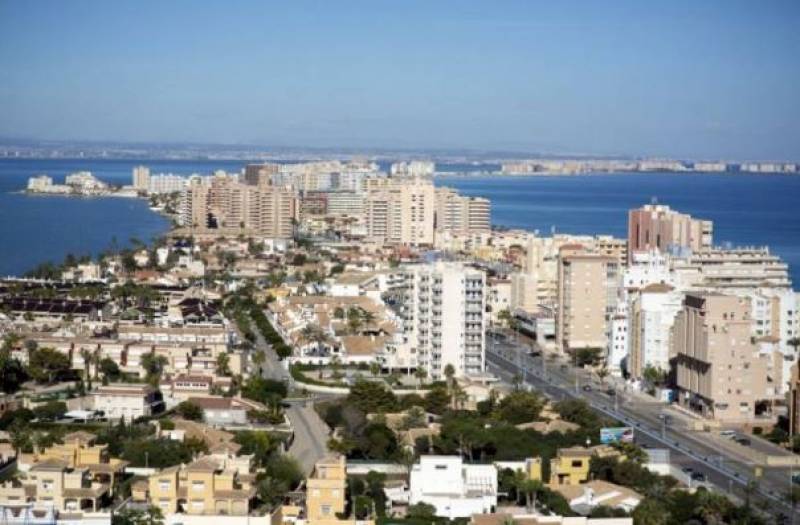
In their survey, they looked at not only sunshine hours, but everything from quality of the beaches and their blue flags, to how close you are to the airport and hospital. The idea was to measure the ‘feel-good factor’ of each place. Towns in Murcia came behind close neighbours like Almería, Alicante and Málaga, but there were plenty of spots in Murcia where people are deemed very happy. Behind San Javier, Los Alcázares and San Pedro came La Unión, Cartagena, Mazarrón, Torre Pacheco, Fuente Álamo, Alcantarilla, and Beniel.
On the flip side, the unhappiest places in their study were Caravaca de la Cruz, Moratalla and Calasparra, coming rock-bottom on the Murcia joy-o-meter.
In happy Mazarrón, the council’s proactive measures in notifying residents on the Camposol urbanisation about changes in the management system have gone so well that they have been able to
speed up the process. A newly revised timetable outlines the next phase of the notification procedure concerning Mazarrón Council’s endorsement of assuming control over completing the public elements of the Camposol urbanisation over the next couple of weeks.
The notification procedure, which started on April 3, entails distributing letters, a legal requirement integral to the takeover process. Council workers are undertaking door-to-door distribution and trying to reach both full-time residents and homeowners who aren’t in right now.
In a separate development, law enforcement authorities have apprehended four Romanian nationals, aged between 28 and 31, with extensive criminal backgrounds, for their involvement in a travelling
criminal group specialising in violent robberies.
The gang employed the so-called ‘hugger mugger’ technique, whereby they come close to their mark and overly friendly, hugging or even kissing them unexpectedly in order to get access to their belongings. The gang targeted mostly elderly victims, and when met with resistance reacted using physical aggression. The investigation against them, which began last January following a reported violent robbery in Alicante, culminated in arrests in Pilar de la Horadada and Murcia, uncovering the group’s elaborate criminal operations spanning multiple regions.
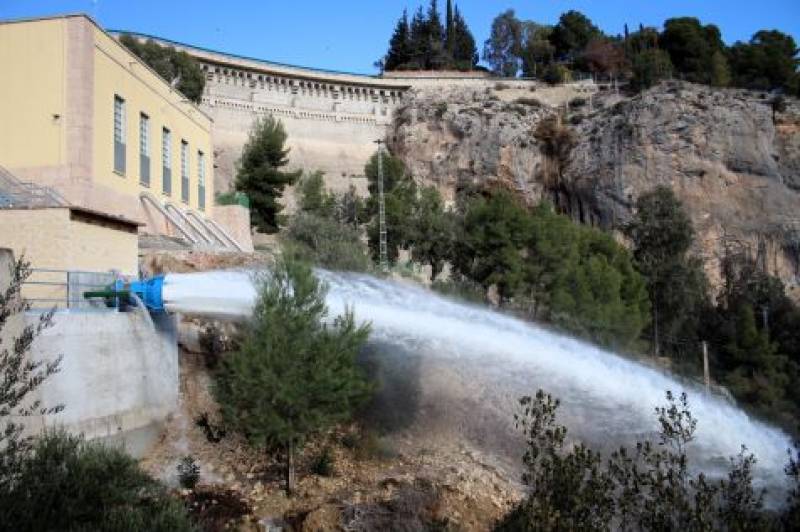
Hopefully some good news on the horizon for farmers and industry in Murcia as the situation of extraordinary drought, which was declared by the Confederación Hidrográfica del Segura (CHS) water authority a month ago,
could be gone by the beginning of May.
Recent rains managed to replenish reservoirs in the Segura basin plenty, but just to be on the safe side the CHS is maintaining vigilance, downgrading the Segura River to a state of alert from the previous state of emergency. It’s an acknowledgement of the fact that reservoirs now stand at 24% of their capacity, which is 6% more than where they were at when the drought was declared. But for now, cautious measures persist, including water usage restrictions for farmers.
Admittedly, at barely a quarter of their capacity, it doesn’t bode well for what we could expect to see coming up in the summer, but we may yet see more rains before the spring is out.
Not this Saturday, not next Saturday, but on the last Saturday of the month, April 27, there will be a
free 5-kilometre guided walking tour of La Manga in English is bound to be extremely popular, so if you or anyone you know may be interested in joining it’s imperative to sign up now before it becomes fully booked!
See our EVENTS DIARY for loads more things to do in the Region of Murcia:
Spain
An EU official almost sparked an international incident this week when he
jokingly referred to Gibraltar as ‘Spanish’, a comment that most people thought to be in very bad taste, particularly since the UK is currently in crunch talks about the future of the Rock’s borders.

During a breakfast briefing in Sevilla, Margaritis Schinas, Vice President of the European Commission, responded to a journalist’s question by quipping, “I can more comfortably say ‘Gibraltar Español’ after Brexit”. The statement was met by gales of laughter from the rapt crowd but the Commissioner has since been accused of grandstanding, especially given the fact that he has nothing at all to do with the negotiations.
And perhaps if he had stopped to think about it, Mr Schinas would have agreed, since the term “Gibraltar Español” was first coined during the Franco era and is generally used by those advocating for Spain’s ownership of the overseas territory.
The UK has been locked in talks over the status of the Rock ever since Britain left the EU, and tensions are running high about control over the airport and port.
Negotiations have encountered hurdles due to Spain demanding full authority over the airport, situated on an RAF base, while in the same breath accusing the UK of fixating on minor issues.
Given that Spain could reasonably revoke the temporary agreement that’s in place at any time, the stakes have never been higher.
However, following Mr Schinas’s unfortunate comment, Spain’s foreign minister, José Manuel Albares, and Maros Sefcovic, the European Commission vice-president who is leading the Gibraltar talks, issued a joint statement that indicates the talks are going well.
They said: “The negotiations between the EU and the United Kingdom regarding Gibraltar are progressing as planned.”
On April 9, the Spanish authorities apprehended a 26-year-old Belgian man, identified only as ‘Adil’, at Madrid’s southern bus terminal, Méndez Alvaro, who they suspected of being involved in
terrorist activities.
Adil, bound for France, had arrived in Spain earlier that day through Málaga and was found with an array of concealed firearms – a G-3 style automatic weapon with 7.62mm rounds, three fully-loaded clips, a 9mm handgun and three ballistic vests.
It later transpired that the young man is facing a long list of serious charges in Belgium, including homicide, armed robbery and kidnapping.
The incident was all the more frightening given its timing, since officials were forced to beef up surveillance and safety protocols in Madrid on April 10 and 11 amid terror concerns targeting UEFA Champions League matches.
Threatening messages attributed to ISIS advocated violence under the ominous banner “Kill them all” alongside specific stadium references, namely Madrid’s Santiago Bernabéu and Wanda Metropolitano arenas, along with London and Paris match sites.
Despite widespread panic generated by these posts across various social media platforms, the Spanish administration maintained they aimed to generate fear instead of posing genuine danger.
On a more pleasant note, there’s good news for frequent train travellers as Spain’s main train operator Renfe has this week
opened up bookings for the next round of free travel passes, which will run from May 1 until August 31. These passes are hugely popular with regular commuters, or those planning multiple trips during the summer months.

To participate in this promotional offer, customers must submit a 10-euro deposit for Cercanías, Rodalies or regional trains, or a 20-euro deposit for Media Distancia rides. Once passengers finish 16 return trips within the designated period, their deposit will be refunded.
And what’s even better is that these complimentary passes cover routes in the vast majority of the country. The most popular free routes in Spain include major cities like Asturias, Bilbao, Cadiz, Malaga, Madrid, Murcia, Alicante, Santander, San Sebastian, Sevilla, Valencia and Zaragoza, as well as regional networks such as Catalonia’s Rodalies.
Additionally, travellers can enjoy half-price deals on Avant lines connecting dozens of major cities.
Savvy commuters leveraging the free pass can potentially save between 200 and 400 euros compared to standard fares depending on frequency and distance of their usual travels.
Alicante
On Friday April 5, the aircraft veered off course and diverted to Barcelona after the air stewards discovered a British traveller had downed an entire bottle of Disaronno that he bought in the duty free in the UK. The plane was stranded on the tarmac for 75 minutes while police hauled the boozed-up Brit and his friend off the flight.
While the police in Barcelona were met with the usual cheers from passengers as the offender and his friend were led off the plane, most of those onboard were bemused by the whole episode.
In a recording of the scene, one woman commented: “A few too many drinks but they didn’t really do anything.”
Another added: “This is ridiculous. A flight to Alicante stopped in Barcelona because someone drank a bottle of Disaronno, lovely.”
Ryanair later issued a statement saying that the flight to Alicante was diverted “due to a disruptive passenger onboard”.
While Ryanair has no problem with passengers purchasing duty free booze and carrying it on board, travellers are strictly prohibited from drinking it on the flight. On its website, the budget airline warns that infringements of these guidelines result in disciplinary action.
If you’re looking to get out and about this weekend in Alicante, then you’ll be spoiled for choice with all the goings on, and what’s even better is that the weather promises to be beautiful. One of the main events on the social calendar is taking place in the city from Thursday April 11 until Sunday April 14: the
Santa Faz Fiestas.
The Santa Faz festival is an important religious celebration held annually in Sant Joan d'Alacant, a coastal town located near Alicante’s capital city.
The centrepiece of the festival is a procession featuring a revered image of the Virgin Mary, popularly known as Our Lady of Santa Faz. Devotees believe that this sacred icon, brought from Rome in the late 15th century, possesses miraculous healing powers.
But Santa Faz is much more than processions. Over the weekend, Avenida de Alicante will be taken over by 118 outdoor market stalls offering a vast assortment of culinary delights like classic paella dishes, candies, ice cream parlours and churros stands to religious souvenirs, jewellery, artisanal creations, leatherwork, fabrics, pottery and more.
Six conventional kiosks will also be set up in Luis Foglietti Square, showcasing religious merchandise, clothing and accessories. Three additional vendors are located nearby, offering Holy medals, baked treats, sandwiches, clothes and scarves inspired by the pilgrimage.
For the daredevils out there, the 2024 Amusement Fair is sure to delight. With 31 rides open between April 11 and 14, visitors of all ages are in for adrenaline-packed entertainment featuring beloved classics such as bumper cars, hair-raising rollercoasters, spooky ghost trains and exciting gaming stations.
On Thursday April 11 and Friday 12, locals and tourists can sink their teeth into the International Tapa Route's second edition, presenting ten establishments offering cuisine from all over the world. And don’t worry about getting around, as the council has put on buses to ferry customers between restaurants.
On Saturday evening, April 13, the Campo Auditorium Party bursts onto the scene, teeming with dancing, live music, creative workshops and more tasty treats lasting deep into the night.
Then, on Sunday April 14, there’s a dog show as well as an arts and crafts fair.
All of the proceeds raised will be used to support local organisations such as ADIMAR, the Mental Health Association of Guardamar (ASMEGU) and the animal shelter SAT.
Andalucía

This Sunday in Seville is the start of the
Feria de Abril – the city’s famous April fair that brings together flowers, food, flamenco and horses for a celebration of all things typically Andalusian.
The fair is held, as is natural, on the fairgrounds, a wide, open dusty space that is transformed when over a thousand stands are set up for eating, drinking and dancing. Horse-drawn carriages meander between these casetas, pulling shutter-happy tourists and locals clad in the finest spotty flamenco regalia with large flowers in their hair.
During the week-long fair, which is just the first of many about to begin all over Andalucía in the coming months, people stroll around during the day and have a nice family lunch and maybe a bit of a gentle dance, and then at night it turns into a massive party that goes on ‘til the wee hours of the morning.

The parade grounds are lit up by a huge arching gate pulsating with blinding lights, like Málaga at Christmas, and festivities are brought to a close on Saturday April 20 with a massive fireworks display.
Seville Fair is unique in that, of the more than 1,000 casetas that serve food and drink, only 16 are open to the public and have prices that are generally more affordable. The rest are all private, accessible only by members or by express invitation. But that shouldn’t put you off visiting – there’s plenty to do and see at the Feria de Abril. Already this year, in the run-up to the opening of the fair, there have been fires in two of the private stalls, but thankfully they were not too serious and the fair will go ahead as planned.
Last week, the Costa del Sol was rocked by the
death of an American tourist who appeared to have passed away following drug-fuelled sex games with her partner, who was promptly taken in for questioning.
Following earlier speculation that the art teacher died as a result of some sort of erotic play with José Betancourt, investigators are now probing deeper into potential gender-based violence and homicide angles.
Mr José Betancourt, a construction manager in Texas, contacted Málaga emergency services in the predawn hours of April 6 upon discovering Ms Pitman unconscious in bed. He has been refused bail and is currently in custody in Alhaurín de la Torre Prison.
The victim relocated to the Valencian Community in Spain in November 2023, intent on breaking free from Mr Betancourt’s grasp, but it now seems that he somehow tracked her down to the Costa del Sol and made contact.
After spending several days together in Málaga, Ms Pitman’s lifeless body was located inside a luxurious Airbnb-style flat called The Clock House, which reportedly charges up to 430 US dollars per night.
President of the Junta de Andalucía, Juanma Moreno, made a speech this week about swimming pools. Despite water reserves being topped up nicely over Semana Santa, the regional prez has preferred to be a bit doom-and-gloom about it all, warning against the ills of “excessive optimism”. A summer Scrooge if ever there was one.
Joking aside, he has a point when he says that the rains, while beneficial, “have not been uniform throughout Andalucía”. So, while he reckons that in Huelva, Seville, Cádiz and the north of Córdoba private swimming pools may be filled up, in Málaga, Almería and the south of Granada the water situation is still critical enough to
maintain the prohibition on the pools of individual villas being filled up with water that is safe for human consumption (before pool chemicals are added).
Communal pools will be allowed, he says, and, at the end of the day, “This is something that each town council will have to decree”. So it’s really not up to him at all, but to your local mayor. Now you know who to go running to!
You may have missed…
- 90s UK rock and pop bands playing in Murcia this summer.
A number of great UK and international bands have already been booked to play at Murcia’s Visor Fest this September, including Kula Shaker, The Charlatans and loads more. Tickets on sale now…
- Camposol tarmacking project delayed again… but only for a limited time.
Due to various interruptions engineering companies ask for extensions to 3 municipal road works contracts, including the Camposol Avenida de los Covachos project.
- Body of dead woman with over 30 stab wounds found in Abanilla, Murcia.
The corpse of a woman was found in a field in the municipality of Abanilla this Wednesday morning with more than thirty stab wounds in her. She is thought to be a foreign sex worker from Eastern Europe, and the Guardia Civil's man suspect is an Alicante man also of foreign origin.
- Málaga voted top city in Spain to learn Spanish.
Again and again, Málaga is recognised around the world as one of the ultimate tourism destinations and most desirable places for expatriates to live. This week, the king of the Costa del Sol can add another feather to its cap, as it has emerged as the very best city in all of Spain for learning languages!
- What is the best place in Spain to install solar panels?
There’s one region in the south of Spain that gets more sunshine hours than any other, making it the perfect place to rely on solar energy…
And that’s it again for another week. Flies by, doesn’t it? Good of you to read to the end. I hope at least some of what you read was interesting or of use to you. And if not, there’s always next week.
See you then!





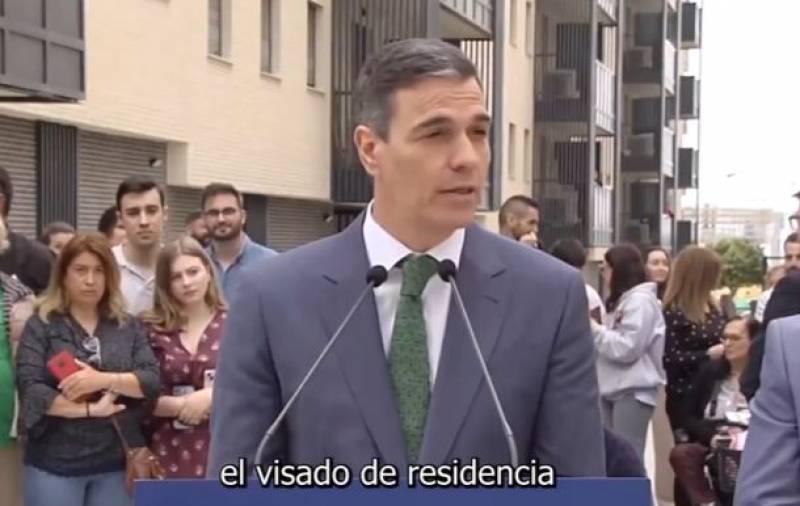
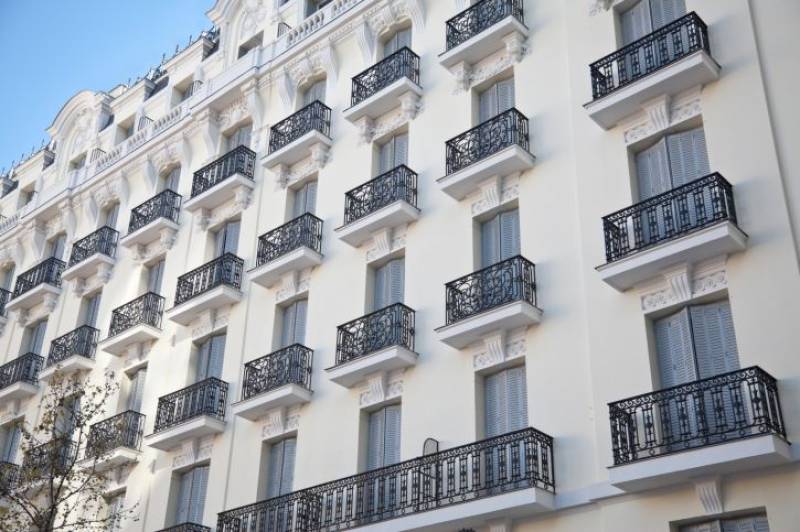
 In their survey, they looked at not only sunshine hours, but everything from quality of the beaches and their blue flags, to how close you are to the airport and hospital. The idea was to measure the ‘feel-good factor’ of each place. Towns in Murcia came behind close neighbours like Almería, Alicante and Málaga, but there were plenty of spots in Murcia where people are deemed very happy. Behind San Javier, Los Alcázares and San Pedro came La Unión, Cartagena, Mazarrón, Torre Pacheco, Fuente Álamo, Alcantarilla, and Beniel.
In their survey, they looked at not only sunshine hours, but everything from quality of the beaches and their blue flags, to how close you are to the airport and hospital. The idea was to measure the ‘feel-good factor’ of each place. Towns in Murcia came behind close neighbours like Almería, Alicante and Málaga, but there were plenty of spots in Murcia where people are deemed very happy. Behind San Javier, Los Alcázares and San Pedro came La Unión, Cartagena, Mazarrón, Torre Pacheco, Fuente Álamo, Alcantarilla, and Beniel. Hopefully some good news on the horizon for farmers and industry in Murcia as the situation of extraordinary drought, which was declared by the Confederación Hidrográfica del Segura (CHS) water authority a month ago, could be gone by the beginning of May.
Hopefully some good news on the horizon for farmers and industry in Murcia as the situation of extraordinary drought, which was declared by the Confederación Hidrográfica del Segura (CHS) water authority a month ago, could be gone by the beginning of May. During a breakfast briefing in Sevilla, Margaritis Schinas, Vice President of the European Commission, responded to a journalist’s question by quipping, “I can more comfortably say ‘Gibraltar Español’ after Brexit”. The statement was met by gales of laughter from the rapt crowd but the Commissioner has since been accused of grandstanding, especially given the fact that he has nothing at all to do with the negotiations.
During a breakfast briefing in Sevilla, Margaritis Schinas, Vice President of the European Commission, responded to a journalist’s question by quipping, “I can more comfortably say ‘Gibraltar Español’ after Brexit”. The statement was met by gales of laughter from the rapt crowd but the Commissioner has since been accused of grandstanding, especially given the fact that he has nothing at all to do with the negotiations. To participate in this promotional offer, customers must submit a 10-euro deposit for Cercanías, Rodalies or regional trains, or a 20-euro deposit for Media Distancia rides. Once passengers finish 16 return trips within the designated period, their deposit will be refunded.
To participate in this promotional offer, customers must submit a 10-euro deposit for Cercanías, Rodalies or regional trains, or a 20-euro deposit for Media Distancia rides. Once passengers finish 16 return trips within the designated period, their deposit will be refunded.
 This Sunday in Seville is the start of the Feria de Abril – the city’s famous April fair that brings together flowers, food, flamenco and horses for a celebration of all things typically Andalusian.
This Sunday in Seville is the start of the Feria de Abril – the city’s famous April fair that brings together flowers, food, flamenco and horses for a celebration of all things typically Andalusian. The parade grounds are lit up by a huge arching gate pulsating with blinding lights, like Málaga at Christmas, and festivities are brought to a close on Saturday April 20 with a massive fireworks display.
The parade grounds are lit up by a huge arching gate pulsating with blinding lights, like Málaga at Christmas, and festivities are brought to a close on Saturday April 20 with a massive fireworks display.